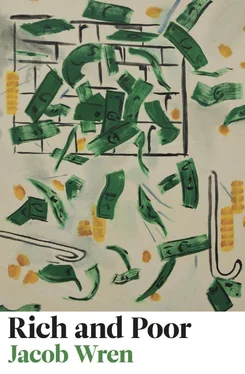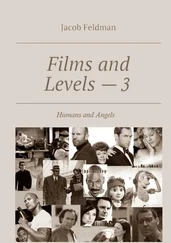— You wanted them to resist.
— I didn’t want anyone to do anything. I wanted to test the waters. See what was possible. And right away I learned something that frightens me. The waters are favourable. Just about anything is possible.
— Why does that frighten you?
— I don’t actually think we can win.
— Why not? What else do we need?
— I keep asking myself what my husband would do. But he’s dead. And he never had to deal with anything like this. We used to strategize together. I always felt I knew just as much as he did. Perhaps that’s why I came to find you. I wanted to put that feeling to the test. I wanted my chance.
— What would he have done?
— We need a war chest. We need resources. We need food and water, enough for the strike to last months, enough for as long as it lasts. Do you know anyone?
It was then I told her about Emmett. I didn’t tell her everything. I sketched in the details as lightly as possible. I tried to stay focused on the fact that I was planning to call him, that he was someone who wanted to help (which might have been a lie, but I was hoping it was true). She was also brainstorming who she could call, friends and colleagues of her husband. People who might send food and water, but also who might come here, fight alongside us. She was listing names as we walked. Her husband had had many friends.
1.
Everyone is replaceable. If one million workers go on strike, we get rid of them and find one million more. Some of those workers might find new jobs, end up all right, while others might fall on hard times, have difficulty making ends meet, starve or even die. But we all die sooner or later. Of course, if they replace me, it releases the golden parachute and nothing in my material life suffers or changes. But apart from that slight difference it’s the same. They can replace one million workers just as easily as they can replace me; no matter how talented, qualified or indispensable I think I might be, there’s always someone else who can do the job.
These questions of downsizing seem to be filling my mind because, here on the flight, I’ve been reading about strikes. It seems we are living in a new golden age of strikes, a new wave of divisions and subdivisions that suddenly feel it’s their God-given right to unionize. The report is awash with statistics: ten years ago there were seventy-two strikes, five years ago one hundred and twenty-eight, last year, which is the focus of the report, there were apparently two hundred and thirty-six. I sit on the plane reading all this, trying to understand what it means, wondering whether I should simply put the report down and return to one of the poetry books.
I stare at the report, at page after page of charts and statistics, and think to myself that it is a document about a zeitgeist. I know enough about labour history to know that workers strike when they have good enough reason to believe they can win something: more money or better conditions. What is it in the air that once again makes those bastards believe they can win? What I notice most is the degree to which these work stoppages appear to cover more and more distance over time. There is a map on page eighty-two of the report, each dot representing an instance of labour trouble that occurred over the past year, and the dots seem so evenly spread out across the surface of the globe. What we have traditionally done, moving production from one part of the world to another in order to avoid labour unrest, no longer feels as convenient.
Considering how many divisions actually fall within the auspices of the organization, two hundred and thirty-six strikes actually aren’t that many. In the conclusion of the report, I learn that one hundred and fifty of them were put down without any union formation, and one hundred of those without making any salary or workplace concessions. So last year there were in fact only eighty-six successful strikes, a pittance, and yet still the zeitgeist so clearly seems to be saying: we believe we can win. Last year it was two hundred and thirty-six. In five years will it be five hundred, or in ten years a thousand? What if all the divisions and subdivisions manage to come together and strike at the same time? This seems impossible, but sitting here on this intercontinental flight, perhaps feeling more than a little paranoid, I have the strange feeling that nothing is impossible.
Then I turn the question around and come at it from another angle. The organization as a whole makes a certain margin of profit. If we give more to every single worker in every single division, this margin of profit would be reduced. But how much could it be reduced before the organization was no longer profitable? What’s more, if on top of this you were to take a small percentage of the salaries of all upper management, such as myself, let’s say three or four per cent, and redistribute it among the workers, to what extent would this gesture ameliorate their protests or concerns? Clearly there was almost infinite room to play, cat and mouse or any other game we felt up for. Every zeitgeist is perhaps also a game, and this game is being played on a field we could clearly call our own. I wondered if this might be my road back into the limelight: the great dealmaker, the negotiator, riding the crest of the zeitgeist towards a new era of labour-management relations. But it was also a dangerous game, showing my throat to more reactionary forces within the organization who want little more than the most possible work for the lowest dollar. If they have a chance to do me in, there is no question they will not hesitate for a moment.
I’m still thinking about what that Italian kid said about virtuosity, that his generation are virtuosos who will use their virtuosity to reorganize the means of production to their greatest benefit. If this can even be considered a legitimate threat, one possible recourse might be to simply make them an offer they can’t refuse. I worry I’m becoming desperate, going soft, willing to consider any option that might fully reenergize my drifting reputation. I put down the report and pick up one of the poetry books. Flipping absentmindedly through the pages, I have this feeling I often have trying to read poetry: all these poets are the same. When dealing with something one apparently doesn’t want to actually deal with, this is always the easiest way out: it’s all the same. They all look the same, they all say the same things, they are a cliché of a self-parody of a cliché. All the poets searching for some clear, striking phrase or image that will more precisely reflect their position or some aspect of their lives. All the strikers demanding more money, more rights, more consumer goods, more dignity. I stare at the pages of poetry but feel distracted, unable to focus.
What are the clichés that accurately reflect me, that me and my class of assholes seem to say over and over again, like super-elite broken records. That the poor are lazy, that we work harder than everyone else and deserve every penny we make (in my particular case, this happens to be true), that we are the global class and therefore effortlessly, with great skill and determination, run the world. That finance is complicated; not everyone can effectively understand it, and it should be left in the hands of those of us who do. These clichés are almost poems. Depending on the situation, I myself have said similar things, but I’ve never completely believed them. Perhaps I’ve never completely believed anything, always searching for the angle that will help me overcome the next immediate obstacle, while at the same time trying to keep my sixth sense honed in on the long game. I’ve never been particularly sure that I’ve deserved anything. I like to gamble and I like to win. And, at the end of the day, there’s actually no such thing as cheating. Now, halfway through this fucking losing streak, I can’t seem to stop asking myself which dice to roll and where. I can’t remain in crisis forever. Sooner or later I’ll have to make my next move. Sooner or later I’ll have to come up for air.
Читать дальше












